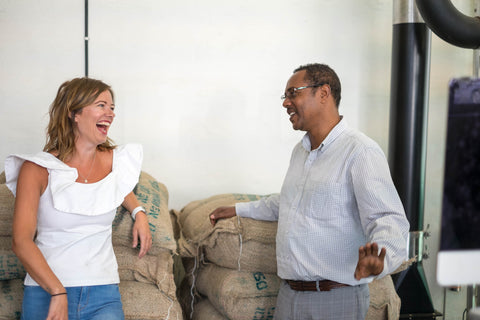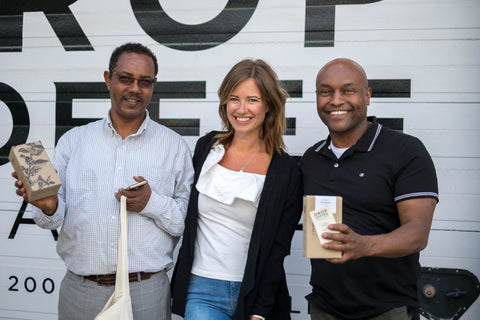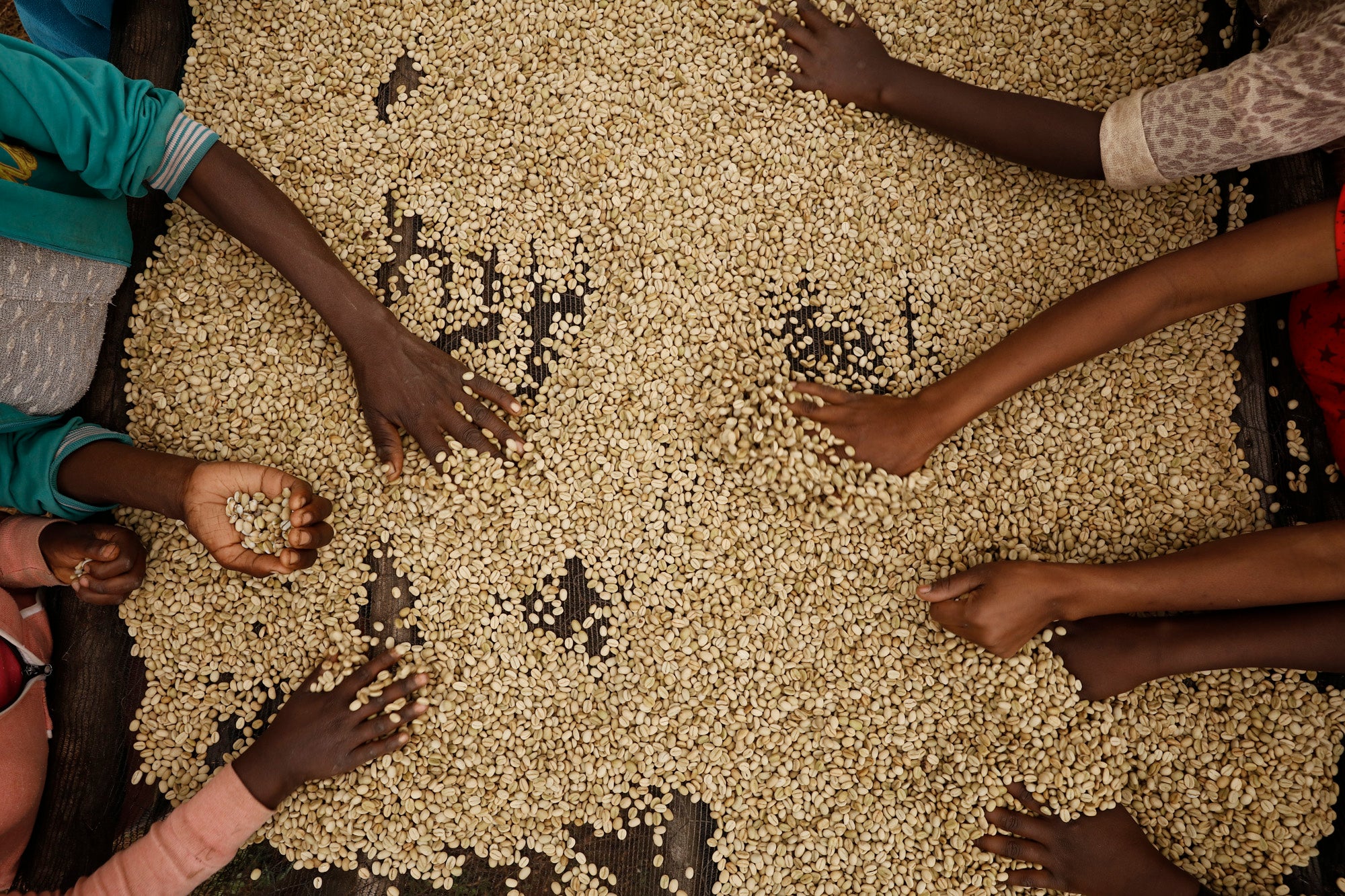Visit from Hunkute, Sidama Union
We're now releasing the coffee from Hunkute from Sidama Union in Ethiopia. It's a coffee we've been working with for many years and visited several times together with our green coffee source in Ethiopia, Nordic Approach. A few days back we had Tsegaye Anebo, manager of Sidama Union. At the top there is some picture, taken by our head of retail Jesper Hedlund. We were roasting the very first batch of Hunkute together and had a meeting about the general updates and the future. At the bottom of the blog you'll find the information about this years crop from Hunkute that is being released today.

The delivery of this years Hunkute literally arrived 45 minutes before Tsegaye Anebo, manager of Sidama Union, arrived the roastery.


Roasting Hunkute with Tsegaye Anebo, manager of Sidama Union and Nordic Approach's Seife Tuuloskorpi.
About Hunkute
Ethiopia is the birthplace of coffee. More than anything I'm amazed by how they live with the product. In Ethiopia many process, roast and drink their coffee themselves, as a a country is consuming over 40% of what they are producing themselves. In Ethiopia there is over 1.1 million small holder coffee farmers, delivering cherries to a cooperative or private washingstation.
Hunkute is made up of two washing stations (the imaginatively named Hunkute Site 1 and Hunkute Site 2) and is located in the highlands of Dalle region in Sidamo, both belonging to Hunkute Cooperative, made up of 900 members (2017). Hunkute Cooperative is connected to the Sidama Union.
Hunkute 1 is located at an altitude of 1850 meters and started ten years ago whilst Hunkute 2 is located at 2150 meters and started five years ago. The washing stations are collecting cherries from both the members and surrounding farmers whom want to deliver their cherries to the washing station.
Payment at Hunkute
Since Sidama is such a mecca in coffee the market is competitive for the cooperatives in the region. This is one of the reasons Hunkute are paying the farmers up front daily during harvest (November-January) unless the farmer prefer different. They also have a second payment based on the selling price which is being payed to the farmeres very latest by August, which is a great difference compared to how late we've seen some farmers being paid when visiting several cooperatives in Ethiopia. In the Sidama Union about 70% of the payment is going back to the farmers and the rest are for investments at the wahingstations and the cooperative.
Being both certified Organic and with Fair Trade the washing station is good in keeping documents and reports.
The production at Hunkute 

Hunkute got 920 connected members delivering coffee during harvest from the nearby area in Dalle, Sidama. Throughout the year organic fertilizer is common at the farms, pruning of the trees are less common. The coffee needs to be mainly mature red to be considered as "Grade One". Cherries are hand sorted for unripe and overripe cherries by the farmers before they go into production. The same afternoon/evening as picking has been done the coffee is being pulped meaning that the skin and pulp is removed from the beans. After this, the beans are being fermented under water for 24-36 hours, dependent on the weather conditions. It’s then graded in washing channels into two grades based on density before soaked under clean water in tanks for 12-24 hours.

Grading channels where the coffee is being separated by density.
The coffee is then removed to raised African beds where the coffee is dried in the sun for 10 to 15 days covered with hessian cloths. During midday and at night coffees are covered in plastic.
Sidamo Union have from this year (harvest January 2017) dry milled the coffee at their new mill belonging to the union, whilst they previously have used a drymill in Addis Abebbea. Have seen the previous mill I could tell by the photos Tsegaye Anebo showed me of the mill that the working conditions were massively improved with proper light and not much dust and from the beans that the process have been more even in terms of the grading and sorting this year.

Mr Gasese Ganora, head of quality and Mr Belinha Dura, manager (taken in Dec 2015).
About Hunkute, how we get our hands on this pretty coffee
All of the cooperatives in Ethiopia belong to a Union, in this case, the Sidamo Union, which sell and export the coffee to our green coffee sourcers Nordic Approach. Through them, we've been buying Hunkute for five years and have visited the washing stations Hunkute 1 and 2 several times throughout the years. One can easily see that Hunkute is superbly run, aiming for quality as well as increasing quantity and members.

Manager Sidama Union Tsegaye Anebo, Drop Coffee's Joanna Alm and Nordic Apprioach's Seife Tuuloskorpi at Drop Coffee August 2017.
Ethiopia update harvest 2016-2017
The drought at Africas Horn hasn't left anyone untouched this year. According to Ethiopia's president, Mitiku Kassa, the number of drought victims had reached 7.8 million of people in the country. The drought has also heavily decreased farming not only by cows not having access to water but also other agriculture. As an impact of the very dry weather the beans is smaller than usual this year.
Below is a picture from January 2017 on different parts of Yirgacheffe that coffee farms were drying out. Visiting in June, hence the rain period, the region looked very lush. However, there is an overlying worry for enough rainfall in the next few year. And other impacts on the farming due to climate changes.

Left picture; Yirgacheffee suffering from drought. Right picture: Rain season in Guji.
In some coffee producing regions over the country, a riot was done as a protest to the unions, where hundreds of washing stations were damaged and put on fire during a short period of time. In Yirgacheffe, where over 60 washing stations were damaged, the local government decided to cover the cost by Yirgacheffes yearly budget to make the suffered process stations able to process coffee again this year. However, this means that many politicians in the region are not going to be paid fully this year as other cuts in the budget.
As a try out for a few years the governmentally controlled that private exporters to buy coffee from are now opening up so one can buy coffee directly from the producer or cooperative as an importer. This will hopefully mean that the coffee is going smoother (read quicker) to us after harvest. However, the unions are built with the philosophy that the cooperatives in the union are strong together, therefore Sidama region is concerned to look after all of their connected cooperatives when there is a bigger interest where the demand and quality focus is not as high.

Visiting Hunkute after post harvest June 2017.
Facts
Producer: Hunkute Cooperative
Washing station: Hunkute Site 1 and Hunkute Site 2
Location: Dalle, Sidamo
Varietal: Ethiopian Heirloom. Improved varietals and native coffee of forest origin.
Picking period: December 2016 - January 2017
Sourced by: Nordic Approach
Elevation: 1850 - 2150 meters
Processing: Fully Washed
Flavour description: Starting off juicy with a light body, and finish off a little more dry with a lingering citric acidity. Notes of apricot, black tea and white floral with a sweet chocolate bottom.
Learn More
- Choosing a selection results in a full page refresh.
- Press the space key then arrow keys to make a selection.
